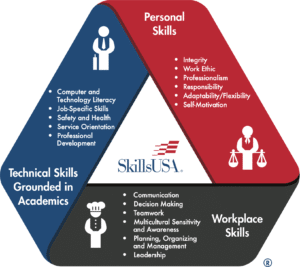Volume 37 Number 6 | December 2023
Crafting Character and Cultivating Professionalism in Aspiring Medical Laboratory Scientists and Technicians
Phyllis Ingham, EdD, MLS(ASCP)CM, AHI(AMT), ASCLS Today Volunteer Contributor

To begin, let us first take a look at the definition of the term professionalism. The author David Maister defines professionalism as “an attitude … it implies pride in work, a commitment to quality, a dedication to the interests of the client, and a sincere desire to help.”
Professionalism is a “life-long set of beliefs, attitudes, and behaviors that must be learned, internalized, personally constructed, and reconstructed.”

A 2020 poll of human resource and business leaders conducted for the Center for Professional Excellence (CPE) at York College of Pennsylvania identified five primary characteristics of professionalism:
- Personal interaction skills, including courtesy and respect
- Communication skills, which include listening skills
- Positive work ethic
- Motivated and task oriented
- Professional appearance, self-confidence, and self-awareness
According to the poll, nearly 60 percent of the hiring decisions for new college graduates are based on assessments of the applicants’ professionalism.
Furthermore, one in every three respondents believed that fewer than half of all new graduates exhibit professionalism in the workplace. Those who cited a decrease in professionalism pointed to young workers’ sense of entitlement for the jobs, changes in culture and values, and lack of work ethic among new workers.
In the article, “Professionalism in Medical Laboratory Science,” by Martin (2017), Martin discusses the crucial role of professionalism within the field of medical laboratory science by taking a look at the various dimensions of professionalism and its impact on patient care and collaboration within the overall healthcare system. The highlighted professionalism attributes of ethical behavior, accountability, and competence integrated with effective communication skills are essential for maintaining patient safety, as accurate laboratory results are used to diagnose disease and make optimal treatment decisions.
A recent survey of employers conducted by SkillsUSA revealed the important characteristics employers expect from our students as career path entry level exhibited attributes.
- Professionalism/Work Ethic: 83.4%
- Teamwork/Collaboration: 82.3%
- Verbal Communication: 82.0%
- Critical Thinking/Problem Solving: 72.2%
- Written Communication: 71.5%
- Ethics/Social Responsibility: 70.6%
- Information Technology Applications: 68.6%
- Lifelong Learning/Self-Direction: 58.3%
- Diversity: 56.9%
- Creativity/Innovation: 45.5%
All of these characteristics are of utmost importance, but how do we craft and cultivate these in our programs? In our medical laboratory technology program at West Georgia Technical College, we made a three-fold plan to incorporate a step ladder/scaffolding approach and focus creating the professionalism component of the curriculum in three phases. In addition, each phase would be taught and assessed within various courses throughout the program curriculum.
Phase 1 would be to introduce all the professionalism concepts and measure student understanding of terms involved. This first step of training and teaching professionalism would occur in the introductory course of the medical laboratory program. The learning focus and goals would include comprehending terms such as the following.
- Integrity: An employee with integrity fosters trusting relationships with patients, coworkers, supervisors, and other interdisciplinary teams in the healthcare setting.
- Responsibility/Attendance: Feeling personally responsible for job performance, showing up on time, putting in best effort.
- Quality: Caring about the quality of work, not just how quickly a task is completed.
- Discipline/Goal setting: Completing tasks/assignments, staying focused on goals.
- Teamwork: Respect peers, help the team to meet its goals.
- Critical Thinking and Decision Making: Encourages students to think about implications of actions.
Phase 2 of training and teaching professionalism would take place at the midpoint of the program course curriculum and would involve the following.
- Case-Based Scenarios: Real life case studies to discuss ethical dilemmas and “what would you do” examples.
- Role Play: Students analyze situations, resolve conflicts, work collaboratively to solve issues such as bullying, gossiping, unengaged employees, patient confidentiality, reporting errors, conflict of interest, informed consent, end of life care, conflict resolution, workplace harassment, and patient autonomy.
- Empathy: Use best practice examples to show the impact of accurate patient test results on patient care.
- Cultural Sensitivity: Exercises to increase cultural awareness and reduce unconscious bias.
Phase 3 of training and teaching professionalism in the curriculum would occur in the capstone project of the final course in the medical laboratory program and would consist of the development of five professionalism case studies. Students create case studies that specifically involve the various departments of the laboratory utilizing critical thinking and professionalism skills learned throughout the professionalism steps/phases.
In conclusion, our new professionalism curriculum design and approach to teaching professionalism to our students is currently in phase 3, and our senior students will be completing their capstone projects in December. The final results are not yet complete to provide a detailed analysis, but with certainty we can conclude that our students are much more focused on every aspect of character and professionalism within the medical laboratory field. We also concur with the experts, “that teaching professionalism to medical laboratory students is not only a requirement, but a fundamental necessity.”
As our graduates contribute significantly to patient care, their adherence to ethical standards and proper professional conduct has far-reaching consequences. It is our program’s belief that by implementing these values into our curriculum, the future employers of our graduates can be assured the highest level of patient trust, safety, compassion, empathy, and overall quality of care are indeed beyond the lab coat!
References
- American Medical Association. (2016). Code of Medical Ethics: Professional self-regulation. Retrieved from https://code-medical-ethics.ama-assn.org/chapters/professional-self-regulation
- ASCLS (American Society for Clinical Laboratory Science). (2020). Code of ethics.
- College of American Pathologists. (2021) Code of ethics.
- Crossley, J., & Vivekananda-Schmidt, P. (2009). The development and evaluation of a Professional Self Identity Questionnaire to measure evolving professional self-identity in health and social care students. Medical Teacher, 31, 603-607.
- Maister, D. (2000). True professionalism: The courage to care about your people, your clients, your career. New York, NY: Touchstone Press.
- Martin, (2017) Professionalism in Medical Laboratory Science.
- “Nine Ground Rules for Cohesive Team BehaviorTM.” TAC4 Solutions. N.p., n.d. Web. 26 Mar. 2013.
- Jenkins, Amelia, and Demand Media. “5 Factors That Demonstrate a Strong Work Ethic.” Small Business. N.p., n.d. Web. 26 Mar. 2013
- Noe, D. P. “The Importance of Confidence in the Workplace.” Vancouver Confidence Coach Suzanne Fetting Absolute Confidence RSS. N.p., n.d. Web. 26 Mar. 2013.
- SkillsUSA (2023). The Foundation for Everything We Do. Retrieved from https://www.skillsusa.org/who-we-are/skillsusa-framework/
- Smith, J. A. (2020). Ensuring Patient Safety through Teaching Ethics and Professionalism to Laboratory Students. Journal of Medical Laboratory Education, 15(2), 75-89.
- Topaz, M. & Hafner, L.P. (2017) Linking patient safety culture and patient outcomes: A systematic review. Journal of Patient Safety, 13(4), 210-209.
- University of Massachusetts: Professionalism in the Workplace: A guide for effective etiquette. Aug 20, 2020
Phyllis Ingham is Program Director Medical Laboratory Technology at West Georgia Technical College in Waco, Georgia.